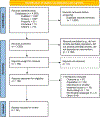Can psychological interventions prevent or reduce risk for perinatal anxiety disorders? A systematic review and meta-analysis
- PMID: 37619299
- PMCID: PMC10569160
- DOI: 10.1016/j.genhosppsych.2023.08.005
Can psychological interventions prevent or reduce risk for perinatal anxiety disorders? A systematic review and meta-analysis
Abstract
Objective: Little is known about the extent to which interventions can prevent perinatal anxiety disorders. We conducted a systematic review and meta-analysis to examine whether interventions can decrease the onset and symptoms of perinatal anxiety among individuals without an anxiety disorder diagnosis.
Method: We conducted a comprehensive literature search across five databases related to key concepts: (1) anxiety disorders/anxiety symptom severity (2) perinatal (3) interventions (4) prevention. We included studies that examined a perinatal population without an anxiety disorder diagnosis, included a comparator group, and assessed perinatal anxiety. We included interventions focused on perinatal anxiety as well as interventions to prevent perinatal depression or influence related outcomes (e.g., physical activity).
Results: Thirty-six studies were included. No study assessing the incidence of perinatal anxiety disorder (n = 4) found a significant effect of an intervention. Among studies assessing anxiety symptom severity and included in the quantitative analysis (n = 30), a meta-analysis suggested a small standardized mean difference of -0.31 (95% CI [-0.46, -0.16], p < .001) for anxiety at post intervention, favoring the intervention group. Both mindfulness (n = 6), and cognitive behavioral therapy approaches (n = 10) were effective.
Conclusions: Interventions developed for perinatal anxiety were more effective than interventions to prevent perinatal depression. Psychological interventions show promise for reducing perinatal anxiety symptom severity, though interventions specifically targeting anxiety are needed.
Keywords: Anxiety; Meta-analysis; Perinatal; Prevention; Systematic review.
Copyright © 2023 Elsevier Inc. All rights reserved.
Conflict of interest statement
Declaration of Competing Interest All other authors declare that they have no known competing financial interests or personal relationships that could have appeared to influence the work reported in this paper.
Figures
References
-
- Dennis C-L, Falah-Hassani K, Shiri R. Prevalence of antenatal and postnatal anxiety: systematic review and meta-analysis. The British Journal of Psychiatry. 2017;210(5):315–323. - PubMed
-
- Leach LS, Poyser C, Fairweather-Schmidt K. Maternal perinatal anxiety: A review of prevalence and correlates. Clinical Psychologist. 2017;21(1):4–19. doi: 10.1111/cp.12058 - DOI
-
- Viswasam K, Eslick GD, Starcevic V. Prevalence, onset and course of anxiety disorders during pregnancy: A systematic review and meta analysis. Journal of affective disorders. 2019;255:27–40. - PubMed
-
- Viswasam K, Berle D, Starcevic V. Trajectories and predictors of anxiety symptoms during pregnancy in an Australian sample. Australian & New Zealand Journal of Psychiatry. 2020;54(12):1173–1181. - PubMed
-
- Bayrampour H, Tomfohr L, Tough S. Trajectories of perinatal depressive and anxiety symptoms in a community cohort. The Journal of clinical psychiatry. 2016;77(11):0–0. - PubMed
Publication types
MeSH terms
Grants and funding
LinkOut - more resources
Full Text Sources



